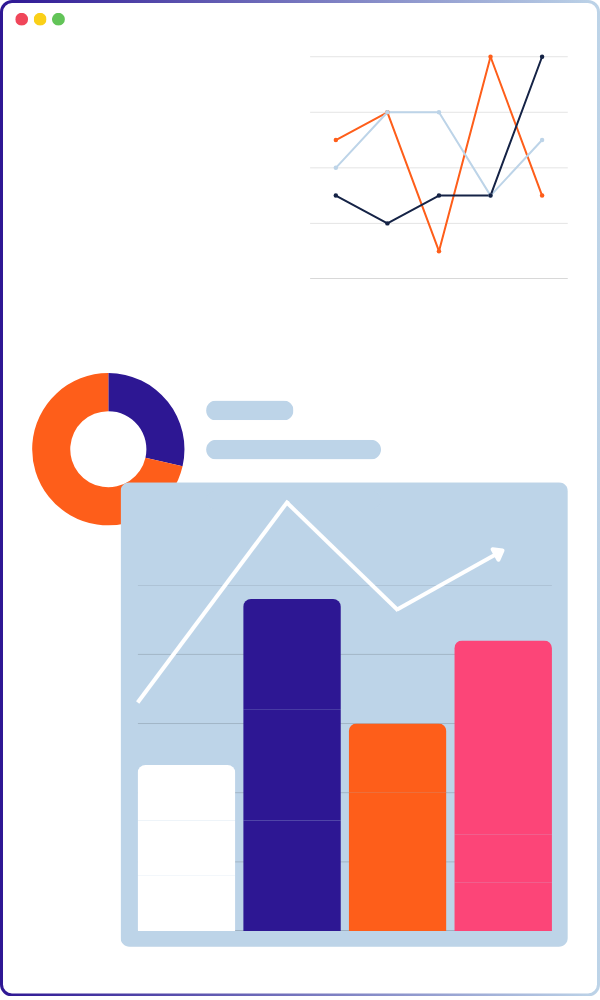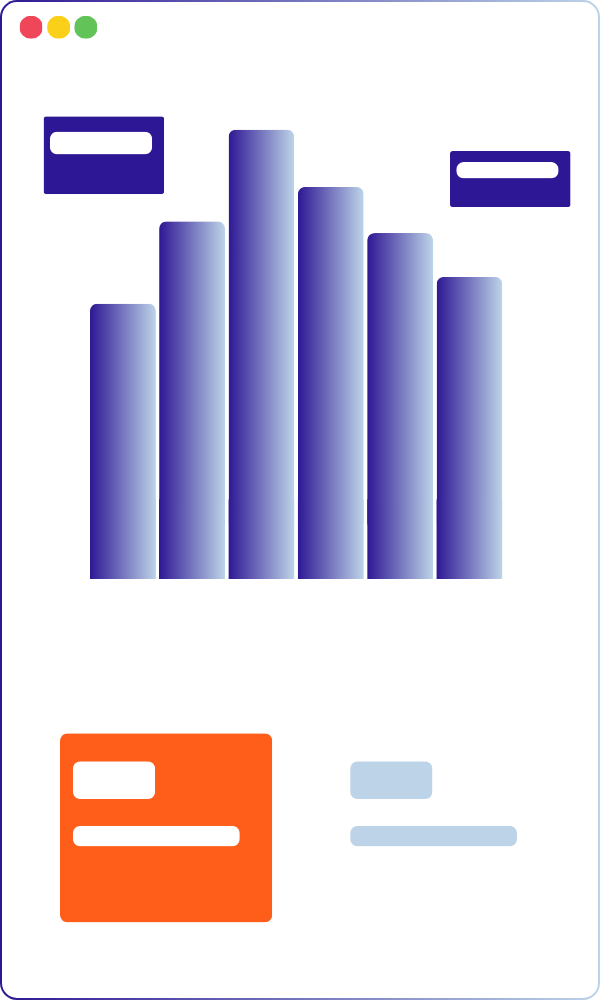Marketing Effectiveness
Measurement
Unlock the true potential of your marketing efforts with our advanced AI-driven Marketing Mix Modeling (MMM) and Multi-Touch Attribution (MTA) solutions. Our solutions comprehensively analyse your marketing channels, enabling you to optimize your budget allocation and maximize your return on investment.
Marketing Mix Modeling
With our state-of-the-art MMM solution, gain comprehensive insights into the impact of your marketing channels, accurately measure ROI, and optimize your budget allocation to drive significant growth.
Multi-touch Attribution
Our cutting-edge MTA solution empowers you to understand the true influence of each touch point in the customer journey, enabling you to make data-backed decisions, optimize your marketing efforts, and unlock untapped potential for higher conversion rates and revenue.
Partner with us to turn your marketing data into clarity, confidence, and measurable growth.
How can your business start measuring marketing effectiveness?
Struggling to assess the effectiveness of your marketing strategy? In today's competitive market, measuring performance is vital. It drives growth and maximizes ROI. Recent studies show that strong measurement techniques increase ROI by 30%. Businesses that use these techniques outperform those that don’t.
As marketing evolves, data-driven decision-making is now the norm. Yet, many companies still struggle to accurately measure the effectiveness of marketing strategies. This can be caused by various factors, like not correctly defining the key performance indicators, the low quality of the data or relying on a too limited set of measurement methods (often just one).
Business has become more complex so our advice is to combine multiple methods and to triangulate when possible. Triangulation is often seen as an optimal way to measure the effectiveness of your marketing strategy. It considers Marketing Mix Modeling (MMM), Multi Touch Attribution (MTA) and Experiments/Lift studies as the three corner stones. Each solution has strengths and weaknesses and there is no silver bullet. But combining multiple approaches can provide marketeers with both strategic and tactical insights to optimize their marketing effectiveness. This section provides you with a guide to measuring effectiveness of a brand’s marketing strategy. It covers the tools, metrics, and benefits of the various solutions including the choices to make on outsourcing versus in-housing.
.gif)
What is Marketing Effectiveness?
Marketing effectiveness refers to the extent to which a company's marketing efforts successfully achieve their desired objectives. It involves a comprehensive assessment of how well marketing strategies perform, based on the analysis of key metrics and KPIs (Key Performance Indicators). By evaluating the outcomes and identifying both strengths and areas for improvement, businesses can refine their marketing approaches to maximize impact and return on investment.
Importance of measuring Marketing Effectiveness
Measuring the effectiveness of marketing is crucial for several reasons – they all contribute to a business's success and sustainability. Here’s why marketing effectiveness measurement is vital:
- Strategic Impact
- Insight & Risk Management



Improves ROI
Return on Investment (ROI) is a key indicator of the effectiveness of marketing strategies. Precise measurement of marketing effectiveness reveals top-performing strategies, which lead to better resource allocation for your organization. Further, this ensures marketing budgets fund the most impactful activities, maximizing ROI.
- Resource allocation: Knowing what works helps direct funds to effective campaigns, ensuring marketing success.
- Cost efficiency: Cutting spending on ineffective strategies boosts cost efficiency and ensures that every dollar spent contributes to marketing success.

Informs Strategy
Data-driven insights are invaluable for refining marketing strategies. By measuring marketing effectiveness, your business can adapt its tactics and improve the following:
- Campaign optimization: Measuring the effectiveness of marketing can find weak spots in a campaign, allowing for adjustments to improve performance.
- Strategic planning: Historical data from marketing analysis informs long-term decisions, enabling more precise planning.
- Innovation and experimentation: Understanding current effectiveness encourages experimenting with new approaches, fostering continuous improvement.

Competitive Advantage
In a competitive market, it is imperative to know your marketing effectiveness to stay ahead of the competition. Measuring the effectiveness of your marketing strategy can significantly boost your competitive advantage in the areas of:
- Market positioning: Analyzing marketing performance helps you better position your brand, increasing market share.
- Adaptability: Measuring effectiveness of marketing allows for quick changes to shifts in consumer behavior or market trends, keeping your campaigns up-to-date and topical.
- Benchmarking: Regular marketing effectiveness analysis allows for benchmarking against industry standards or competitors, which helps identify strengths and areas for improvement.

.png?width=580&height=650&name=longer%20accordion%20(2).png)
.png?width=580&height=650&name=longer%20accordion%20(3).png)
Knowing your marketing effectiveness provides deep insights into customer behavior and preferences when looking at:
- Customer journey mapping: It tracks interactions across touchpoints, highlighting areas for improvement and enhancing the customer experience.
- Personalization: Accurate measurement allows for more personalized marketing messages, improving customer engagement.
- Retention and loyalty: Effectiveness insights can help boost customer retention and loyalty.
.png?width=580&height=650&name=longer%20accordion%20(2).png)
Measuring your marketing's effectiveness helps to spot risks early, allowing for timely interventions.
- Early warning signs: Watching key performance indicators can spot issues, such as declining engagement rates from measured marketing.
- Data-driven decisions: Relying on marketing effectiveness measurement reduces the risk of poor decisions based on guesstimates, leading to more reliable outcomes.
.png?width=580&height=650&name=longer%20accordion%20(3).png)
Key metrics for Marketing Effectiveness Measurement
KPIs, the key performance indicators, are quantifiable metrics measuring how companies or divisions achieve a specific goal. Marketing KPIs measure how effective your marketing efforts are to overall brand performance. For consumer brands, the most important and logical one is to look at Revenue attributed to Marketing in relation to cost (Return on Marketing Investment/ ROMI).
.png)
However that might be too shortsighted as it provides only a narrow view on the brand performance and the role of marketing. You might also want to look at other indicators to determine how effectively a brand achieves its objectives and how well it positions against its competitors. It includes other metrics like brand awareness, preference, loyalty, website traffic, market share and customer lifetime value. Choosing the right key marketing effectiveness metrics isn’t a one-size-fits-all exercise. Each business and industry is unique and so are its needs and goals. Hence, the metrics that work for one company might not be as effective for another. By carefully selecting and prioritizing these metrics, you can tailor your strategies to achieve the desired outcomes effectively.
Additionally, tracking these metrics consistently allows you to adjust your tactics in real-time to optimize performance. Ultimately, understanding and leveraging the right metrics can lead to more informed decision-making and higher ROI on your marketing efforts.
.png?width=1080&height=1080&name=Tests%20for%20the%20website%20(26).png)
Tools for measuring Marketing Effectiveness
Brands need to optimize their marketing at a strategic level and at the same time they need to have the tools to be agile and optimize their plans in real time. This is the reason why triangulation is nowadays so popular as it is using multiple marketing effectiveness solutions in conjunction.
.png?width=580&height=650&name=longer%20accordion%20(5).png)
.png?width=580&height=650&name=longer%20accordion%20(6).png)
.png?width=580&height=650&name=longer%20accordion%20(7).png)
Marketing Mix Modeling
The strategic decisions are the big high-level decisions that link to their business and financial objectives. This is something that MMM is particularly strong at. Where to spend by marketing budget in the best possible way? Should we invest more in advertising or promotions? How much advertising budget do I need? How is ToM awareness impacting sales?
Often regression techniques using weekly or daily data are being applied to understand the incremental effect of spending an additional dollar/euro on each of the marketing channels. MMM needs data over a longer period of time which is both a strength and a weakness. A strength, as it is able to measure also longer-term effects, and drawback as it has only limited or aggregated data to measure the short-term effects.
.png?width=580&height=650&name=longer%20accordion%20(5).png)
Multi-touch Attribution
Advertisers and agencies also need to act close on the ball. How do I optimize my digital campaigns in almost real-time. Not only within platforms but also between platforms. Multi-touch attribution is a critical tool for marketing effectiveness analysis across various customer touchpoints. It provides insights on how digital channels are contributing to a conversion both at campaign and ad level. MTA is not using weekly data but very granular data about consumer journeys, both the converting- and non-converting ones. Unlike traditional models that attribute success to the last touchpoint, MTA provides a more detailed understanding of the entire customer journey by analyzing how each interaction contributes to conversions. This comprehensive approach allows businesses to identify high-impact touchpoints, refine their strategies, and optimize marketing efforts for greater success.
.png?width=580&height=650&name=longer%20accordion%20(6).png)
Experiments
In theory, a well set up experiment is the gold standard approach to measurement, but in practice they can be tricky to set up properly and hard to scale. Experiments are particularly strong in testing the strength of a specific tactic within your larger plan. Experiments or incremental testing are often being used to test a particular platform in the broader mix or provide more detail to calibrate certain outcomes from your MMM. It is often set up in a way that you can compare an exposed versus non-exposed group to understand the value of a platform.
That said, the reality is far more difficult as not always are the exposed and non-exposed groups identical. Often, these experiments are set up by comparing regions (exposed, non-exposed) or within a specific target group, but it is hard to control all the variables between these groups.
.png?width=580&height=650&name=longer%20accordion%20(7).png)
Benefits of In-Housing Marketing Effectiveness
An important decision is whether to measure marketing effectiveness in-house or outsource it to specialized agencies. Outsourcing means partnering with external agencies that handle all aspects of the measurement (e.g. marketing mix modeling). This approach uses the expertise, technology, and resources of external specialists, allowing you to focus on your core activities while gaining insights into your marketing performance. In-housing means using an internally developed solution or licensing software that analyzes your performance. The in-housing approach is using tools like those of ScanmarQED to quickly build a stable and accurate measurement process. This approach enhances the accuracy and control of marketing data, whilst providing you with technology, technical support and appropriate training.
What are the advantages of in-housing?
Greater Control
Bringing Marketing Effectiveness Measurement in-house gives you direct access to data and analysis, whilst also providing the tools, technical support and training. This solution improves your control over marketing effectiveness measurement whilst providing the reassurance of our MMM knowledge and expertise.
- Immediate access to data: In-house teams can quickly analyze data, leading to faster insights.
- Transparency: Full control over data and methods ensures accurate, transparent marketing effectiveness analysis.
- Iterative improvement: Refining models with real-time feedback boosts your accuracy over time.
Customization
In-housing measurement allows you to develop tailored models that better measure your marketing effectiveness.
- Bespoke solutions: Custom models give better insights into the effectiveness of marketing strategies, which are more accurate and relevant.
- Flexibility: Internal teams can quickly adapt models to reflect changes, ensuring the ongoing effectiveness of marketing strategies.
- Integration with internal systems: Connecting with other systems improves the accuracy of marketing effectiveness analysis.
Enhanced Data Security
In-house Marketing Measurement processes boost data security, another vital key to marketing effectiveness measurement.
- Data privacy: Controlling data ensures compliance with privacy regulations and protects against breaches.
- Proprietary insights: Sensitive insights remain confidential, safeguarding competitive advantages.
Improved Collaboration
In-house Effectiveness Measurement fosters closer collaboration, enhancing the effectiveness of marketing strategies.
- Cross-functional teams: Collaboration across departments aligns strategies, improving marketing effectiveness.
- Unified objectives: In-house MMM ensures alignment toward common business goals, leading to more effective marketing.
Continuous Learning and Development
Building in-house MMM capabilities offers ongoing learning opportunities, further enhancing marketing performance.
- Skill development: Teams gain expertise in advanced analytics, benefiting long-term improvement.
- Knowledge retention: Internal teams keep valuable insights, enhancing future marketing effectiveness analysis.
Marketing Mix Modeling
(MMM)
ScanmarQED's advanced MMM solution gives you deep insights into marketing channel effectiveness, optimizing budget allocation and driving growth.
Multi-touch Attribution
(MTA)
ScanmarQED’s advanced MTA solution measures marketing effectiveness by analyzing the true influence of each touchpoint in the customer journey.
How ScanmarQED Solutions drive success
Combining ScanmarQED's MMM and MTA tools lets you measure your marketing success, optimize efforts, and drive success. This approach measures all aspects of marketing effectiveness, leading to better business decisions and continuous improvement. For more info and to see how ScanmarQED can help you, request a demo today. Discover how our tools can change your marketing strategy and boost your ROI.

-2.png?width=200&height=200&name=Untitled%20design%20(40)-2.png)
-2.png?width=50&height=50&name=Untitled%20design%20(40)-2.png)







